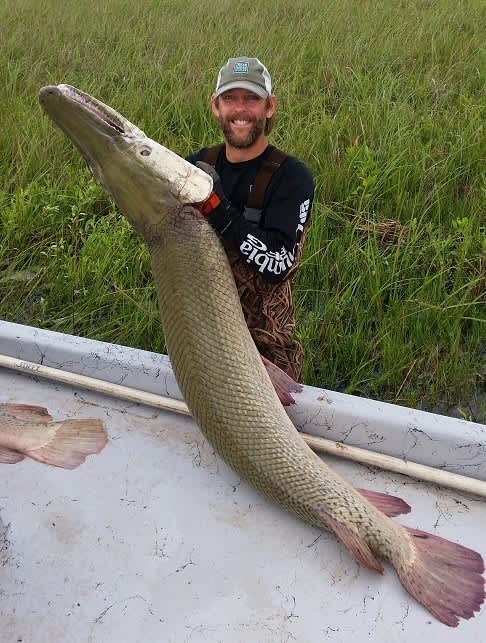Massive Alligator Gar Caught and Released in Texas
OutdoorHub Reporters 05.13.16

This alligator gar could give its reptilian namesake a run for its money. Texas Parks and Wildlife’s Coastal Fisheries division posted a picture of a massive alligator gar to its Facebook page earlier this week. The behemoth fish was caught and released in Matagorda Bay by Fish and Wildlife technician Kevin Willis, although no weight or official measurements were listed. Judging from its sheer size, this alligator gar may not be too far from the current state record.
“Alligator gars can grow up to 8 feet long, weigh more than 300 pounds and live for decades,” Coastal Fisheries wrote on its Facebook page.
Bow fisherman and traditional anglers routinely bring in specimens over 100 pounds, and sometimes even over 200. Few ever match the Lone Star State’s longstanding record however. That was set in 1953 when an angler brought in a 302-pound alligator gar on a trotline. Back then, fishing for gar was nowhere as popular as it is now.
“Historically considered a ‘rough fish,’ the alligator gar has recently gained popularity as a sport fish, attracting national and international attention after being featured on several television shows,” stated Parks and Wildlife on its website. “Texas has one of the best remaining fisheries for this unusual freshwater fish.”
Of course, that does not mean that there are no limits on gar fishing. In 2009 Texas instituted a one-per-day bag limit on alligator gar across the state.
During his service as a wildlife technician, Willis has written occasionally about alligator gar in the Matagorda Bay ecosystem and has advocated for their conservation.
“Though we know little about alligator gar, we do know that loss of habitat is an incessant problem that damages most fisheries to some degree,” he wrote for Texas Saltwater Fishing Magazine. “The alligator gar, in particular, counts on certain backwaters as fertile grounds to spawn and lay eggs in the spring of the year.”
Those spawning areas are now threatened and dwindling. Willis advised both officials and anglers to keep an eye on the species so it doesn’t disappear from Texas forever.

